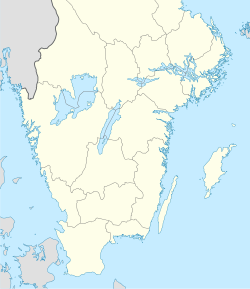Älvsborg Fortress
| Älvsborg fortress | |
|---|---|
| Nya Älvsborg | |
| Gothenburg in Sweden | |

New Älvsborg Fortress today, with Gothenburg in the background.
|
|
| Coordinates | 57°41′6″N 11°50′20″E / 57.68500°N 11.83889°ECoordinates: 57°41′6″N 11°50′20″E / 57.68500°N 11.83889°E |
| Type | Sea fortress |
| Site information | |
| Open to the public |
Yes |
| Site history | |
| Built | 1653–1701 |
| In use | 1676–1869 |
| Materials | Granite, brick |
Älvsborg (also Elfsborg Fortress) is a large sea fortress in Rivö fjord within modern Gothenburg, Sweden. Situated at the mouth of the Göta River, it protected medieval Sweden's only access to the North Sea and the Atlantic Ocean, along with the nearby settlement known today as Gothenburg (formerly named Lödöse, Nya Lödöse, Älvsborg and Charles IX's Gothenburg).
The original Old Älvsborg Fortress (Swedish: Älvsborgs fästning or Älvsborgs slott) was located on the mainland, on the southern shore of the estuary, above modern Klippan. Only few ruins are visible today in the vicinity of the Carnegie-pier.
The old fortress was dismantled and relocated to one of the islands in the estuary, in the 17th century. This New Älvsborg Fortress (Swedish: Nya Elfsborg) is still maintained.
In 1643, a settlement in New Sweden, North America, was named Fort Nya Elfsborg ("Fort New Älvsborg"), after the Swedish fortress. This settlement was abandoned in 1655. Gothenburg was the main centre for Swedes emigrating to America, and the fortress would have been one of the last sights the emigrants saw on leaving the country.
In medieval Sweden, Älvsborg was the country's only access to the North Sea. Bohuslän, the area north of Älvsborg, was part of Norway until 1658; Halland, the region to the south, was part of Denmark until 1645. Sweden's only Atlantic settlement, Lödöse, built about 1200, (known as "Gothenburg 1") was the first settlement located at the mouth of the Göta Älv. It was followed by New Lödöse ("Gothenburg 2") located near the modern town.
...
Wikipedia

